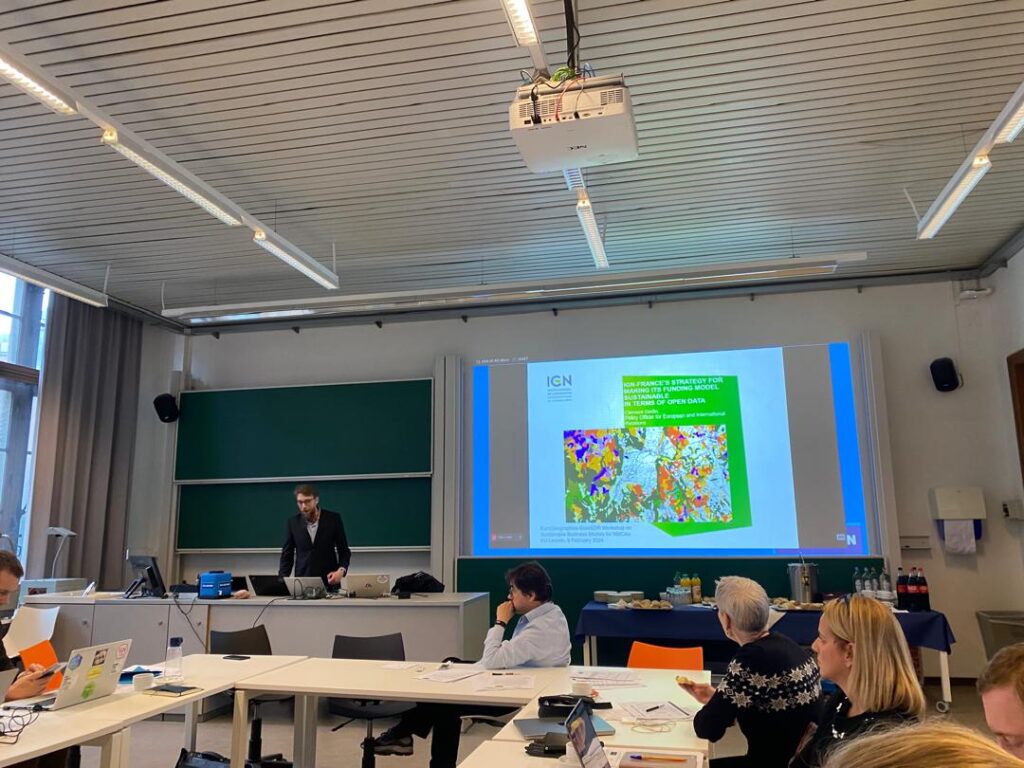
On the 8th and 9th of February 2024, EuroSDR and EuroGeographics organised a workshop, “Sustainable Business Models of National Mapping and Cadastral Agencies (NMCAs)” in Leuven. The workshop was attended by representatives from the NMCAs of Belgium, Denmark, Finland, France, Greece, the Netherlands, and Sweden, as well as several researchers.
Following the European Commission implementing regulation 2023/138 laying down a list of specific high-value datasets and the arrangements for their publication and re-use, NMCAs must provide (geo)spatial data as open data by June 2024. Publishing open government data (OGD) incurs costs to data providers; hence, the implementation of the regulation necessitates NMCAs to rethink and redesign their business models.
The presentations during the workshop can be found here. Instead of summarising these presentations, this blog post reflects some of the insights discussed during the workshop.
The value versus valuation of OGD
While the value of OGD is widely acknowledged in policy and academic discussions (e.g., stimulating innovation, improving business processes, managing disasters), the valuation of OGD in terms of determining and compensating the monetary value to OGD providers still receives less attention than it deserves. Collecting and maintaining data and subsequently processing and disseminating it as open data take up significant human and physical resources (Welle Donker, 2018). However, the organisations providing OGD are often not reimbursed fairly for the costs they incur. Notably, the revenue from the taxation of businesses enabled by OGD goes to the big government coffers instead of directly to OGD providers. In fact, it is debatable whether the reuse of OGD necessarily brings extra tax revenue in the first place (Welle Donker, 2018). This predicament also highlights the difficulty of tracing the reuse of open data and valuing it due to the nature of open data, whereby anyone—including foreign and multinational entities—can use it for any purpose.
NMCAs as open data intermediaries
Some NMCAs have moved beyond providing OGD to providing value-added services around OGD, serving the role of open data intermediaries to some extent. IGN France has moved to a cross-sectoral projects-based funding model to generate income. The organisation has introduced various strategies targeting different (levels of) stakeholders as part of its new business model, namely, Geo-commons strategy (for communities), IGNfab (for start-ups and SMEs), and Datalliance strategy (for companies) (see more). Nevertheless, as emerged during the workshop discussion, the sustainability of the project-based funding model remains to be seen. IGN Belgium also characterised many of their tasks as serving the role of data brokers and clearinghouses, where it facilitates geospatial data sharing across public and private organisations in Belgium. This insight opens up a new research opportunity on public organisations as open data intermediaries and how that could inspire new business models for NMCAs.
New approaches, new skills
IGN France is also shifting its human resources strategy towards adopting geospatial artificial intelligence (GeoAI), a similar approach by the Dutch Kadaster. Presenters from the Dutch Kadaster also shared how the organisation adopted the Lean Management approach to streamline its processes and reduce costs. These insights highlight the need to investigate the future skill sets of NMCAs and OGD providers in general. Notably, with NMCAs possibly taking up some of the functions of open data intermediaries in the future, skill sets related to stakeholder management have become even more important. Understanding the future skill sets would also inform the design of new business models for OGD providers.
Conflicting laws
Participants highlighted the conflicting laws around OGD. For instance, in certain countries, certain government data has to be stored in a more expensive private cloud (instead of a public cloud), even though this data would be disseminated as OGD. This incurs unnecessary extra costs to the OGD provider. Furthermore, laws around market competition that limit the services that public organisations could offer inhibit them from providing value-added services based on their OGD. These insights call for further investigation into relevant laws throughout the OGD value chain and how they impact the OGD processes, costs incurred, and revenue generated by the OGD providers.
Conclusion
The workshop highlights the need to rethink and redesign OGD providers’ business models and the conditions (e.g., legislation) that could enable the invention of new business models. With the technological evolution in AI (particularly GeoAI for NMCAs), the new business models should also incorporate and highlight future skills necessary for OGD providers.
Reference
Welle Donker, F. M. (2018). Funding Open Data. Open Data Exposed, 30. https://doi.org/10.1007/978-94-6265-261-3_4


